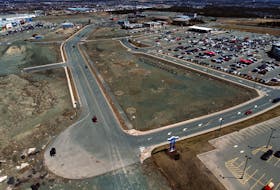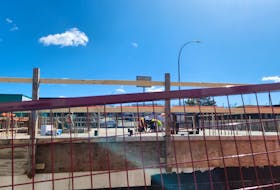Premier Stephen McNeil found himself open for direct criticism while delivering his Open for Business speech in Toronto on Wednesday morning.
“Corporations are coming into Nova Scotia not respecting treaty rights,” Dorene Bernard, an activist from the Sipekne’katik Band in Indian Brook, said emphatically to the premier, interrupting his 16-minute breakfast address to the Canadian Club of Toronto.
“It’s the destruction of the water, of Mother Earth,” said Bernard, who moved up to the right of the podium along with Patsy Stephens of Millbrook.
“We are in a position to stop that from happening.”
The streamed video of the speech showed a slightly flustered McNeil responding to Bernard.
“We are very proud of the relationship that we have with the Mi’kmaq Nation in Nova Scotia,” the premier said. “I am very proud as the premier of our province to stand up in our communities and say that we are all treaty people. Someone signed those treaties on behalf of me.”
McNeil continued: “We’ve driven economic development opportunities to provide an opportunity for your sons and daughters to be able to ensure that our province is sustainable. We’ve absolutely supported and worked alongside your chiefs. As we grow as a province, all Nova Scotians need to see themselves reflected in the important decisions we make, including our First Nations.”
Bernard has long battled against the Alton Gasproject that would draw nearly 10,000 cubic metres of water daily from the Shubenacadie River estuary at Fort Ellis and propel
it through a 12-kilometre underground pipeline to the Brentwood Road cavern site. There, the water will be pumped nearly 1,000 metres underground to flush out salt to create two caverns that will each be about the size of an average office building and capable of storing up to six billion cubic feet of natural gas.
The brine created by the salt dissolution will then be pumped back to the estuary for release into the river system, a gradual discharge of 1.3 million cubic metres of salt over the two- to three-year period. The brining process has not yet begun but Bernard and others argue that it will destroy marine life in the Shubenacadie River system that has historically sustained the Sipekne’katik Band.
Bernard, who also bemoans the April decision by the Canada-Nova Scotia Offshore Petroleum Board to authorize BP Canada to drill a deepwater exploration well about 300 kilometres south of Halifax, doesn’t agree with the premier that the Mi’kmaq have been part of the province’s development decisions.
“You have not consulted the treaty rights holders,” Bernard said of McNeil in a telephone interview as she awaited a flight back to Nova Scotia. “There has been no free, prior and informed consent about Alton Gas or BP.”
Bernard denounced the premier’s invitation to corporations to a Nova Scotia that is wide open for business.
“It’s about protecting all our land, our water, our resources and our identity,” she said. “This is who we are.”
Stephens said in a release that she is proud to have grassroots grandmothers confront the premier “about how he is totally ignoring our treaty rights.”
“We were not consulted in any way on Alton Gas,BP, or many other destructive projects that impact our treaty rights in the name of economic development,” Stephens said. “Mi’kma’ki
is not for sale.”
The two Mi’kmaq women were guests of the Council of Canadians at the premier’s speech that was intended to encourage economic growth in the province.
McNeil said in his speech that when he ascended to the premier’s chair in 2013 he was greeted by outmigration, an aging demographic and a crumbling healthcare infrastructure. He said his government committed the province to a new way of doing economic development, “to partner with the private sector to drive job opportunity and job creation.”
“Investment, if you choose to make it in Nova Scotia, will be the best investment you will make this fiscal year,” he told business leaders in Toronto.
Bernard said she had come to Toronto from an energy conference summit in Detroit, where she heard harrowing tales of environmental debacles related to industrial development projects across North America.
“We’re in the midst of these things coming to our territory,” Bernard said. “This makes me go home and fight even harder. (We were told) to fight for all you have. Once it’s done, it’s done. People need to wake up.”
The premier is in Toronto until Thursday before moving on to Ottawa in his efforts to promote the province as a place to pursue economic and investment opportunities.









